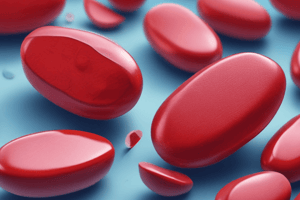Podcast
Questions and Answers
What is the primary role of iron in the body?
What is the primary role of iron in the body?
- To strengthen bones
- To regulate body temperature
- To produce antibodies
- To carry oxygen to the body's tissues (correct)
Which of the following individuals may require iron supplements?
Which of the following individuals may require iron supplements?
- Only athletes
- Only pregnant women
- Individuals with iron deficiency anemia, chronic bleeding, or increased iron requirements (correct)
- Only individuals with iron deficiency anemia (correct)
What is the most commonly used form of iron supplement?
What is the most commonly used form of iron supplement?
- Iron amino acid chelate
- Ferrous sulfate (correct)
- Ferrous fumarate
- Ferrous gluconate
What is a benefit of taking iron supplements for athletes?
What is a benefit of taking iron supplements for athletes?
What is a common side effect of taking iron supplements?
What is a common side effect of taking iron supplements?
Which medication can reduce iron absorption?
Which medication can reduce iron absorption?
What is a precaution to take when using iron supplements?
What is a precaution to take when using iron supplements?
Who should avoid taking iron supplements?
Who should avoid taking iron supplements?
Flashcards are hidden until you start studying
Study Notes
Iron Supplements
What are iron supplements?
- Iron supplements are dietary supplements that contain iron, an essential mineral for the production of hemoglobin, a protein in red blood cells that carries oxygen to the body's tissues.
Why are iron supplements needed?
- Iron deficiency is a common nutritional disorder that can lead to anemia, fatigue, weakness, and shortness of breath.
- Iron supplements are necessary for individuals who have:
- Iron deficiency anemia
- Chronic bleeding (e.g., menstruating women, individuals with ulcers)
- Increased iron requirements (e.g., pregnant women, athletes)
- Malabsorption of iron from food sources (e.g., individuals with celiac disease)
Types of iron supplements
- Ferrous sulfate: most commonly used form, well-absorbed, and inexpensive
- Ferrous gluconate: more expensive, but better tolerated and less likely to cause gastrointestinal side effects
- Ferrous fumarate: less commonly used, but may be better tolerated than ferrous sulfate
- Iron amino acid chelate: a more expensive, highly bioavailable form
Benefits of iron supplements
- Treats iron deficiency anemia: increases red blood cell production, reduces fatigue, and improves energy levels
- Improves exercise performance: enhances endurance and reduces fatigue in athletes
- Supports pregnancy: essential for fetal development and preventing iron deficiency anemia during pregnancy
Side effects and interactions
- Gastrointestinal side effects: nausea, vomiting, diarrhea, constipation, and stomach cramps
- Interactions with medications: antacids, proton pump inhibitors, and tetracycline antibiotics can reduce iron absorption
Precautions and contraindications
- Iron overload: excessive iron intake can lead to iron toxicity, so it's essential to follow the recommended dosage
- Hemochromatosis: individuals with this genetic disorder should avoid iron supplements, as they can exacerbate the condition
Iron Supplements
What are Iron Supplements?
- Iron supplements are dietary supplements that contain iron, essential for producing hemoglobin in red blood cells.
- Hemoglobin carries oxygen to the body's tissues.
Why are Iron Supplements Needed?
- Iron deficiency is a common nutritional disorder that can lead to anemia, fatigue, weakness, and shortness of breath.
- Iron supplements are necessary for individuals with:
- Iron deficiency anemia
- Chronic bleeding (e.g., menstruating women, individuals with ulcers)
- Increased iron requirements (e.g., pregnant women, athletes)
- Malabsorption of iron from food sources (e.g., individuals with celiac disease)
Types of Iron Supplements
- Ferrous sulfate: most commonly used, well-absorbed, and inexpensive
- Ferrous gluconate: more expensive, but better tolerated and less likely to cause gastrointestinal side effects
- Ferrous fumarate: less commonly used, but may be better tolerated than ferrous sulfate
- Iron amino acid chelate: a more expensive, highly bioavailable form
Benefits of Iron Supplements
- Treats iron deficiency anemia: increases red blood cell production, reduces fatigue, and improves energy levels
- Improves exercise performance: enhances endurance and reduces fatigue in athletes
- Supports pregnancy: essential for fetal development and preventing iron deficiency anemia during pregnancy
Side Effects and Interactions
- Gastrointestinal side effects: nausea, vomiting, diarrhea, constipation, and stomach cramps
- Interactions with medications: antacids, proton pump inhibitors, and tetracycline antibiotics can reduce iron absorption
Precautions and Contraindications
- Iron overload: excessive iron intake can lead to iron toxicity, so it's essential to follow the recommended dosage
- Hemochromatosis: individuals with this genetic disorder should avoid iron supplements, as they can exacerbate the condition
Studying That Suits You
Use AI to generate personalized quizzes and flashcards to suit your learning preferences.



